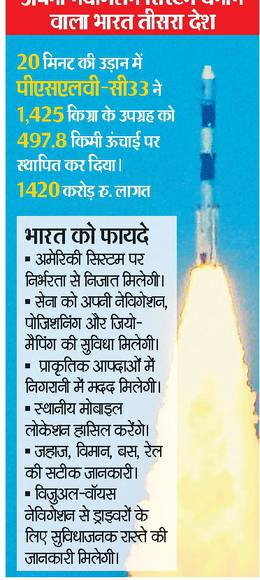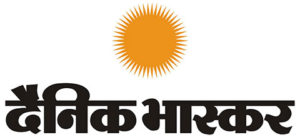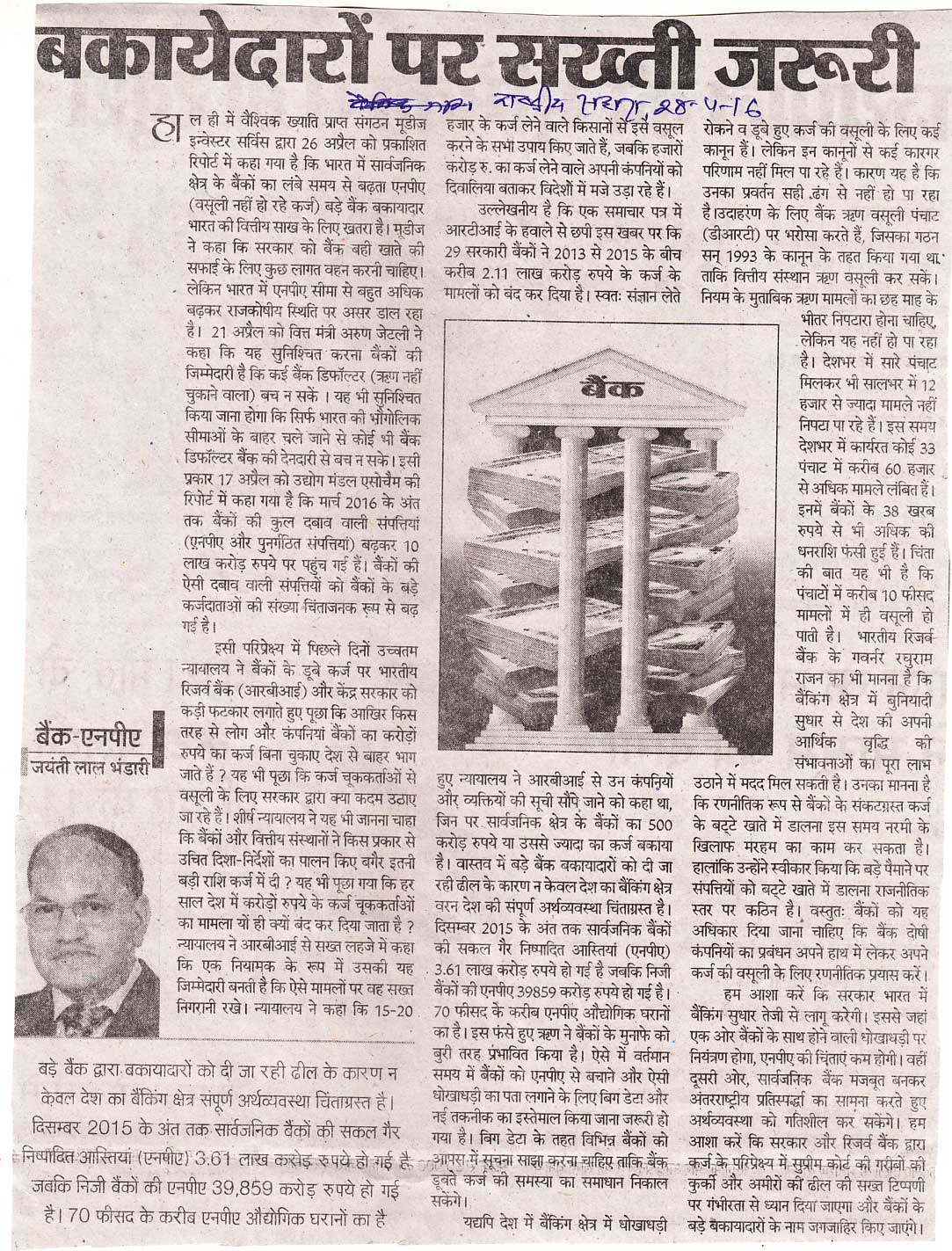
29-04-2016 (Important News Clippings)
To Download Click Here.
‘रिवर्स माइग्रेशन’ की हकीकत जानने आज सलामतपुर जाएंगे राजन
– दुनिया के नामचीन अर्थशास्त्री । 2008 की आर्थिक मंदी की भविष्यवाणी की थी।
-आईआईटी दिल्ली और आईआईएम अहमदाबाद में पढ़ाई की। वे 2003-2006 तक आईएमएफ के मुख्य अर्थशास्त्री रहे।
विकास के ममता मॉडल ने किया माओवाद बेअसर
ममता की तरह दूसरी राज्य सरकारों को इस पर भी गंभीरता से विचार करना चाहिए कि जनजातीय संस्कृतियां देश के लोकतांत्रिक ढांचे के भीतर स्वयं को आहत और उपेक्षित क्यों महसूस करती हैं? माओवादियों के संघर्ष के तरीके पर असहमति है, लेकिन उनके द्वारा उठाए मुद्दों पर असहमति नहीं हैं। उन्हें हल करने की बजाय राज्य सरकारों ने सख्ती का रास्ता अपनाया। नक्सल दमन के लिए जन सुरक्षा अधिनियम और गैरकानूनी निरोधक कानून को कड़ाई से लागू किया गया। उन कानूनों के खिलाफ, राज्य सत्ता के खिलाफ माओवादियों ने युद्ध छेड़ रखा है। यदि माओवादी हिंसा को रणनीति बनाते रहेंगे तो जाहिर है कि शासन को भी अपनी हिंसा को वैध ठहराने का बहाना मिलता रहेगा। कहने का आशय यह है कि हिंसा कोई निदान नहीं है। निदान है ममता मॉडल।
करगिल के समय अमेरिका ने मदद से मना किया, आज भारत ने बना लिया अपना जीपीएस

इसरो वैज्ञानिक 17 साल से इस काम में लगे थे। भारत 1973 से ही अमेरिकी जीपीएस पर निर्भर रहा है। पर करगिल युद्ध के समय घुसपैठ करने वाले पाकिस्तानी सैनिकों की पोजिशन बताने से अमेरिका ने मना कर दिया था। तब हमारी सेना को इसकी सबसे ज्यादा जरूरत थी। इसके बाद इसरो ने तय किया कि वह अपना रीजनल पोजिशनिंग सिस्टम बनाएगा। इस कामयाबी के साथ ही अमेरिका और रूस के बाद भारत अब तीसरा देश बन गया है जिसके पास अपना नेविगेशन सिस्टम है।
आरपीएसके 6 उपग्रह पहले ही लाॅन्च किए जा चुके थे। इस सिस्टम से जुलाई के बाद देश के चारों तरफ 1500 किमी तक की सटीक जानकारी मिलनी शुरू हो जाएगी। हालांकि आम लोगों को इसका पूरा फायदा मिलने में एक से डेढ़ साल लग सकते हैं। इस काम में इसरो के बेंगलुरू स्थित ब्यालालू, जोधपुर, उदयपुर, भोपाल समेत कई सेंटर्स की अहम भूमिका होगी। भोपाल में इसके लिए तीन स्टेशन बनाए गए हैं।
भारत को फायदे
{अमेरिकीसिस्टम पर निर्भरता से निजात मिलेगी।
{सेना को अपनी नेविगेशन, पोजिशनिंग और जियो-मैपिंग की सुविधा मिलेगी।
{ प्राकृतिक आपदाओं में निगरानी में मदद मिलेगी।
{स्थानीय मोबाइल लोकेशन हासिल करेंगे।
{जहाज, विमान, बस, रेल की सटीक जानकारी।
{विजुअल-वॉयस नेविगेशन से ड्राइवरों के लिए सुविधाजनक रास्ते की जानकारी मिलेगी।
इस सेवा को नाविक के नाम से दुनिया जानेगी। अब हमारे रास्ते हम तय करेंगे। सार्क देशों ने कहा तो उन्हें भी ये सुविधा देंगे।’ -नरेंद्र मोदी, प्रक्षेपण के बाद
20 मिनट की उड़ान में
पीएसएलवी-सी33 ने
1,425 किग्रा के उपग्रह को
497.8 किमी ऊंचाई पर स्थापित कर दिया।
1420 करोड़ रु. लागत

A cop-out called prohibition
It is a poor policy option. Alcohol abuse is a public health, not moral, problem.
Prohibition of alcohol is back on the political agenda with the recently elected Bihar government banning its sale and consumption to fulfil a key electoral promise. Other parties, such as the DMK and the AIADMK in Tamil Nadu and the Congress in Kerala, are also championing this cause. These states join a growing list, including Gujarat, a clutch of northeastern states and Lakshadweep, in imposing a policy which is currently not practised in any country outside the Islamic world. That prohibition can win elections is a vivid reminder of the tragic social consequences of alcohol consumption in the form of household impoverishment, domestic violence and premature mortality. That these policies are completely at odds with history and public health science testifies to the failure of our commonsense.
There is no evidence to show that prohibition has ever had its intended impact. Of course, just as banning beef has reduced beef consumption, banning alcohol will lead to reduced alcohol consumption. But, there appears to be little or no correlation between, say, domestic violence or household impoverishment and prohibition. Instead, there is an enormous cost to society, and here I refer not to the obvious massive losses to the exchequer but to the criminalisation of the majority of people who drink sensibly to address the problems caused by the minority who do not. It is, in effect, equivalent to banning motor cars because a few drive rashly.
Prohibition is a very poor policy option to address the adverse consequences of alcohol abuse when compared with a range of more effective public health approaches. The most notable international example of the failure of prohibition is that of the US where a constitutional amendment implemented this policy in the 1920s, only to be revoked 13 years later. The reason was simple: The policies led to the criminalisation of an entire section of the population, from those who manufactured the product to those who consumed it. It replaced a way of life which is as old as mankind with a corrupt nexus of smugglers, police, politicians and bootleggers.
The story is no different in India. As any reader of this paper who has been invited to a party in Ahmedabad can testify, the truly remarkable thing about prohibition in Gujarat is the range of alcoholic brands which are served in private homes. Of course, this is restricted to the rich who bypass regulations by virtue of being able to buy “permits” on medical grounds and escape police harassment. Lisa McGirr argues in her recent book, The War on Alcohol, that the enforcement of prohibition in the US was intrinsically biased against the poor, the working class, immigrant communities, and the marginalised. Prohibition, like so many other policies imposed from the moral high-ground, typically by those who do not drink, disproportionately affects the poor who resort to illegally brewed alcohol when they want a drink, not infrequently leading to their death, and are more likely to be harassed by the police.
Prohibition is rejected by most public health scientists who know this field; even the World Health Organisation does not recommend it. The complete lack of a public health approach to alcohol abuse in India is illustrated by the way in which the government has permitted the shameless surrogate advertising of alcohol by corporations, for example, through selling “bottled water” under the same brand names as their much better known alcoholic beverages. Amongst the many crimes Vijay Mallya seems to have gotten away with, that he could run an airline named after the most popular alcoholic beverage in the country has been perhaps the most damaging of all in terms of its impact on the burden of disease in India.
India remains one of the few nations which still focuses entirely on an archaic de-addiction model, administered by the ministry of social justice and empowerment, to address drinking problems, adhering to a centuries-old idea of these problems being a moral disorder rather than a health condition. There is a total absence of effective counselling interventions for those who wish to control their drinking. Instead, we live in such surreal times that “medicinal grounds” is the one situation in which drinking is permissible in states where prohibition is enforced. Essentially, this means that a person who wishes to drink can obtain a permit, after paying the required fee to a malleable physician, because he is a sharabi and his life would be threatened without a drink. This, of course, is the precise group who in any other country would have been offered psychological or medical interventions to control their drinking!
So, let us be prepared for more criminal activity, more deaths amongst the poor fuelled by illegally brewed poisonous alcohol, more hard liquor being drunk secretly in dingy corners, more corruption in the police force and more misery for those who wish to drink sensibly.
Prohibition of substances which give pleasure to people does not work. Addiction is a health problem, not a moral one, and there are many proven strategies which can reduce its burden. The desire to address the serious social problems caused by a minority of those who consume alcohol by prohibition is a travesty of the experience of history and public health science. When Mizoram repealed prohibition in July 2014, 17 years after it had been imposed, its excise minister explained that he had proposed this bill so that “those people who cannot do without drinks can find good quality liquor at cheaper prices”. He also claimed that he had “asked god to prevent me from introducing the bill in the assembly if that is what he really wanted”. Clearly, god had commonsense. Do our politicians?
Crackpot remedies: From prohibition to even restricting cooking, Bihar government goes overboard
The Bihar government has gone overboard with its advisory to citizens telling them not to perform havans or even cook between 9am to 6pm, on pain of punishment that may include jail. The move is meant as a preventive measure to minimise fires. But besides being an unwarranted intrusion into the personal domain, it is utterly impractical. It is like banning people from taking out cars on roads, in order to minimise the risk of road accidents. Political leaders need to come up with better ideas than this.
The government’s reasoning that cooking fires in heavy winds have been causing an epidemic of fires is flawed. Instead of striving to pinpoint the reasons for the eruption of village fires and taking practical, precautionary measures, it is tilting at windmills. Strong westerly winds in the smouldering summer have led to incidents of fire that have resulted in over 60 people and over a thousand livestock dead this month. Most recently this week, nearly 300 huts were burnt in Begusarai district. This is certainly a public safety issue that warrants attention. But it needs measured administration and surveillance, not knee-jerk reactions. What if heavy winds should blow after 6pm? Should cooking meals be stopped altogether?
The cooking ban is reflective of an intrusive state, as is the prohibition imposed by chief minister Nitish Kumar. Unfortunately bad ideas are infectious in India and the prohibition fad is being lapped up by the political class across states. Despite overwhelming evidence across the world that prohibition only leads to an unholy nexus between a liquor mafia and law enforcement agencies – besides endangering the health of many who drink hooch – Congress in Kerala and all major political parties in Tamil Nadu have promised prohibition in some form during the current assembly election campaign. This is again an example of mistaking symptom for cause.
If the reason for adopting prohibition is domestic violence in families, the only way to curb domestic violence is sharp policing combined with awareness campaigns. That is what government policy must be oriented towards, rather than chasing red herrings. The consequences of prohibition in Bihar have already started to show: four people died after consuming spurious liquor, even as the state is set to lose thousands of crores of rupees in excise duty. For someone with prime ministerial ambitions, Nitish must come up with more imaginative ideas than prohibition.
वैचारिक उलझाव का दौर
यह देखना-सुनना विचित्र है कि वैचारिक उलझाव किस प्रकार सेक्युलरिज्म और राष्ट्रवाद को एक दूसरे के सामने खड़ा कर सकता है। दुर्भाग्य से यह हमारी आंखो के सामने ही हो रहा है। राष्ट्रवाद अर्थात नेशनलिज्म को विदेशी विचार बताया जा रहा है, जबकि हमारे देश में राष्ट्रीयता आदि शंकराचार्य के काल से चली आ रही है, जिन्होंने देश की चारों दिशाओं में मठ स्थापित किए थे। कोई राष्ट्रवाद को विदेशी और उसी सांस में सेक्युलरिज्म को देशी नहीं कह सकता। इसलिए और भी नहीं, क्योंकि सेक्युलरिज्म कुल मिलाकर विदेशी विचार ही है। जेएनयू में कश्मीर की आजादी, भारत के टुकड़े-टुकड़े करने और अफजल के कातिलों के जिंदा रहने पर शर्मिंदा होने वालों को मीडिया का एक हिस्सा अभी भी हाथों हाथ लिए है। कोई नहीं पूछा रहा कि अगर बात बेरोजगारी और शोषण से आजादी की थी तो उसमें भारत के टुकड़े करने, अफजल के कातिलों के जिंदा होने की बात कहां से आ गई? जाहिर है कि वैचारिक धरातल पर सार्थक बहस से इंकार किया जा रहा है। सेक्युलरिज्म तो राष्ट्रवाद को सशक्त करने वाली संगिनी है। दोनों में विरोधाभास की गुंजाइश नहीं है। दरअसल हम विचारशून्यता की स्थिति से गुजरते हुए उस दौर में हैं जहां हमारे परिवर्तन को परिभाषित करने वाले विचारों को भीषण अकाल है। जब चिंतकों का टोटा पड़ जाता है तब छद्मवेषियों की पौ-बारह हो जाती है। आधुनिक समय के हमारे श्रेष्ठतम विचारक, चिंतक और दृष्टा गांधी जी थे। लोहिया जी को समय कम मिला, जयप्रकाश जी के संपूर्ण क्रांति के विचार को तो समझा ही नही जा सका। तब से विचारशून्यता की सी स्थिति है और पता नहीं कि यह यह दौर कब समाप्त होगा। कम्युनिस्ट व्यवस्था के पराभव और उससे मोहभंग के परिणामस्वरूप उत्पन्न वैचारिक निर्वात को अभी भरा नहीं जा सका है। जो कुछ बहसें कहीं दिखती भी हैं वे वैचारिक अराजकता की दिशा में ले जाती हैं।
आज परिवर्तन और विचारों की दुकानें बंद हैं। विचारों की जिंदगी के लिए उनका स्वत:स्फूर्त होना और अपनी जमीन से पैदा होना भी जरूरी होता है। आयातित विचार कभी भी परिवर्तन अथवा क्रांतियों के वाहक नही बनते। हमने देश में माओवाद का उदाहरण देखा है। यह माओवाद किसी वैचारिक प्रतिबद्धता के बजाय हिंसा का साथी हो गया है? यद्यपि हिंसा माओवादी का आधारभूत घटक है, लेकिन यह हिंसा वैचारिक गहनता के बाद उत्पन्न होती है। लेनिन ने सोवियत रूस की क्रांति को मजदूरों की क्रांति का नाम दिया और माओ ने चीन में इसे किसानों की क्रांति कहा। हमारे यहां जो माओवादी अभियान चल रहा है, क्या उसे हम आदिवासी क्रांति कहेंगे? यदि ऐसा नहीं है तो फिर क्रांति के इस आवरण का क्या हश्र होने वाला है? क्रांतियों का एक इतिहास है। अमेरिकी क्रांति, फ्रांस की राज्य क्रांति और रूस एवं चीन की क्रांति। प्रत्येक क्रांति एक दूसरे से प्रकृति में भिन्नता लिए हुए रही। कोई भी एक-दूसरे की नकल नहीं है।
माओ ने लेनिन से प्रेरणा ली, लेकिन अपने को लेनिनवादी या स्टालिनवादी नहीं कहा, लेकिन अपने यहां चूंकि मौलिक वैचारिकता का अभाव है अत: इसे चीन की तर्ज पर माओवाद का नाम दे दिया गया। इसे यदि कानू सान्यालवाद या चारू मजूमदारवाद का नाम दिया जाता तो भी समझ में आता, लेकिन इस परिवर्तन की कामना के प्रस्फुटन को माओवाद का नाम देकर इसके भारतीय क्रांति बनने की संभावनाओं पर स्थायी विराम लगा दिया गया। नक्सलवाद तक गनीमत थी, लेकिन माओ? जिसे सारा भारत भारत-शत्रु और हमलवार के रूप में जानता है वह इस देश के लोगों का प्रेरणास्नोत कैसे बन सकता है? हमारी लोकतांत्रिक व्यवस्था के वर्तमान स्वरूप को लेकर बहस की गुंजाइश है, लेकिन आम तौर पर बहस व्यक्तियों, दलों और संगठनों को लेकर होने लगती है। किसी को खलनायक और किसी को आदर्श सिद्ध करने का मैच प्रारंभ हो जाता है। इस पर एक बहस हो सकती है कि देश की वर्तमान स्थितियों और आने वाले वक्त के मद्देनजर हमारी वर्तमान लोकतांत्रिक प्रणाली और अमेरिकन राष्ट्रपति प्रणाली में से कौन सी हमारे लिए अधिक उपयोगी सिद्ध होगी? क्या इस परिवर्तन में हमें अपने लोकतंत्र को अधिक सक्षम बनाने का अवसर नहीं मिलेगा? हम देखते हैं कि राज्य सरकारें अपने विकास के एजेंडे की तुलना में सरकार को बचाए रखने के लिए कहीं ज्यादा परेशान रहती हैं। उत्तराखंड का संकट इसका उदाहरण है। जनता से सीधे निर्वाचित मुख्यमंत्री अथवा राज्यपाल की स्थिर व्यवस्था आर्थिक विकास को निश्चय ही मजबूती प्रदान करेगी और भावी राष्ट्रीय नेतृत्व की भूमिका भी बनाएगी। यह जरूरी है कि ग्रामों, नगरों के आर्थिक विकास के विभिन्न माडलों पर बहस चले, लेकिन लोग विकास के प्रारूपों पर चर्चा में खुद का असमर्थ पाकर सरकारों को कोसने लगते हैं। हमारी बहस गुणात्मक परिवर्तन वाले बिंदुओं पर नहीं होती।
देश में ऐसे भी वर्ग सशक्त हो रहे हैं जो विखंडित भारत के सपने देखते हैं। क्या हमारे अंदर तक पैठा हुआ जाति-संप्रदायवाद हमारी क्रांतियों का लक्ष्य नहीं बनेगा? क्रांतियां भले ही नई समस्याएं दे देती हों, लेकिन वे वर्तमान को दंशित कर रही शक्तियों और जड़ताओं का समूल नाश तो कर ही देती हैं। हमारे सामने टर्की के कमाल अतातुर्क का उदाहरण है कि किस प्रकार अपने अधिनायकवादी परिवर्तन से उसने पुरानी सड़ांध मारती व्यवस्था को खत्म कर थोड़े से ही समय में टर्की को एक सशक्त, आधुनिक, सेक्युलर और शिक्षित देश बना दिया था। क्रांतियां कोई रोमांस नहीं होती, लेकिन उनके सपने देखने वालों की जरूरत पड़ती है। कहां हैं वे लोग जो परिवर्तन की बेचैनी बड़ी शिद्दत से महसूस करते हैं? आज भले ही वे कहीं नहीं दिख रहे हैं, लेकिन इस देश को चंद्रशेखर आजाद, भगतसिंह जैसे क्रांतिधर्मी चरित्रों के सांचों में ढली अगली पीढिय़ों का इंतजार तो रहेगा ही।
[लेखक कैप्टन आर विक्रम सिंह, भारतीय प्रशासनिक सेवा के अधिकारी हैं]



